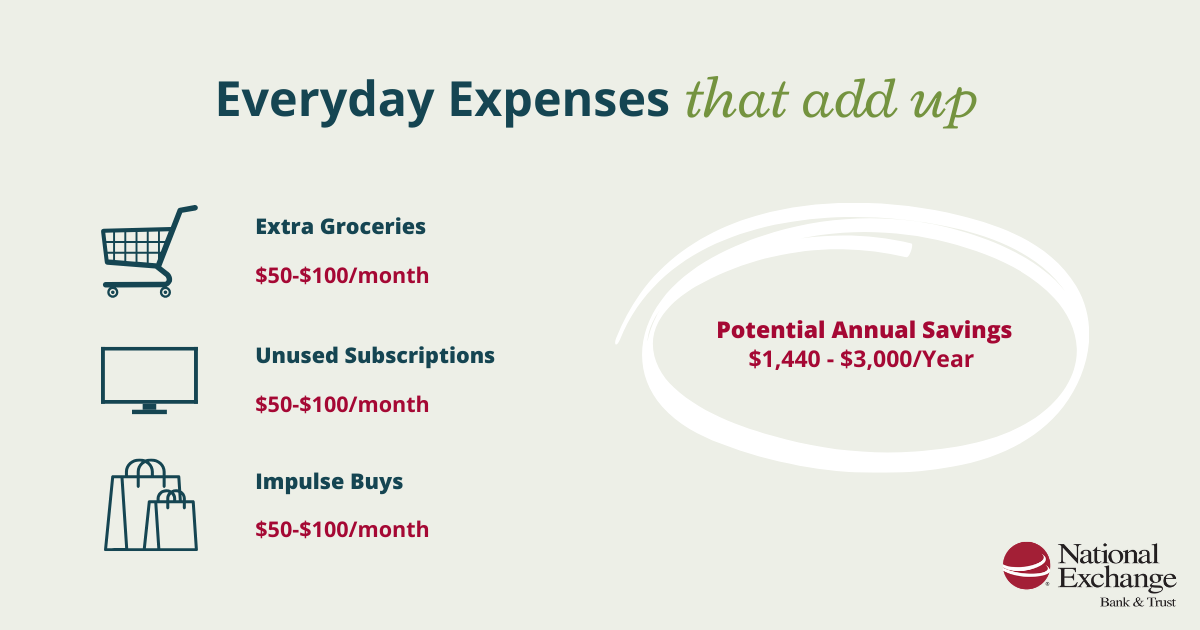Smart Ways to Save More
As the Packer family sat down to prepare for the upcoming school year, the children daydreamed about the first day back when the yellow school bus would pick them up from their dairy farm, and the parents took a look at their budget and realized something surprising. It wasn’t the big things draining their bank account. It was their everyday choices, such as the extra groceries they didn’t need, the streaming subscriptions they rarely used, and the small impulse buys that added up fast.
Sound familiar? Many Wisconsin families feel the same way. Between summer getaways up north, miscellaneous school expenses, heating bills in the winter, and everything else, it’s easy to lose track of where your money goes. The good news? A few simple changes can make a big difference for your family, and National Exchange Bank & Trust is here to get you started on the right track! Check out our helpful budgeting tips and simple money-saving strategies to take charge of your family’s finances with confidence.
Why Budgeting & Saving Matters for Families
Did you know that more than half of Wisconsin residents (52%) live paycheck-to-paycheck, often spending as much or more than their monthly income, according to the Wisconsin Department of Financial Institutions? Smart budgeting can break that cycle and help you save more for what matters most to you and your family. Whether that’s an emergency fund, family vacations, your child’s college education, or a solid retirement cushion. Setting clear savings goals and having a plan in place is the first step to taking charge of your family’s finances with confidence.
Budget Advice for Families: Where to Start
Budgeting doesn’t have to be complicated. Here are some easy ways to start managing your family’s expenses and budget:
- Track and categorize expenses by reviewing your transactions in online banking or your statements. This will give you a baseline of what you are spending now. You might be surprised how many “little things” you find. Use the tools in your tool belt: the Financial Wellness digital money management tool, inside Exchange and the mobile app will help give you a complete picture of your financial accounts, easily track expenses, and create savings goals using your existing accounts.
- Eliminate unnecessary costs. Cancel unused subscriptions and eat out less to save money. Bundling services and subscriptions with relatives or friends can also help reduce costs.
- Create a budget and stick to it. Write down your income and expenses to create spending limits for food, entertainment, and other expenses. Some families like the 50/30/20 budgeting rule (50% needs, 30% wants, 20% savings).
- Make saving a priority. Set up automatic transfers to your savings account for a low-effort way to save. If available from your employer, utilize the Wisconsin Saves Program, designed to help establish savings through the automated saving strategy of split deposit.
- Establish financial goals. Setting financial goals helps create a clear path to follow to better control your money and reduce financial stress.

Money Saving Tips for Families
Once you have a budget in place, try putting these practical money-saving tips for families into action:
- Meal Plan and Shop Smart: Families waste thousands of dollars every year on unused food. Plan meals, make a list, and stick to it.
- Be Smart with Energy: From new insulation to smart thermostats, you can help reduce energy costs, enhance efficiency and take advantage of rebates and incentives for energy-saving projects and products. Focus on Energy is a great resource to start making energy saving decisions for your home and reap the economic benefits.
- Hunt for Local Deals: Many Wisconsin communities have swap groups, neighborhood garage sales, and secondhand kids’ stores to buy gently used items for less. Joining store loyalty programs and shopping the weekly sales ad for your local grocery store can also optimize your savings.
- Enjoy Free Entertainment: There are many free family-friendly events and activities throughout our local communities. Whether it’s a community festival, a movie in the park, or a local organization’s event, there are plenty of ways to have fun without overspending.
Just like the Packer family discovered, it’s often the small, everyday choices that quietly add up and affect your family’s finances. Using simple budgeting tips and smart saving strategies, you can take control and start making those dollars work harder for you. Remember, it’s not about cutting out all the fun, it’s about focusing on what truly matters to your family and building a financial plan that supports your goals. Start small, take it step by step, and before you know it, you’ll feel more confident and in charge of your family’s financial future!
Want to Learn More About Managing Your Money?
Wherever you are in your financial journey, National Exchange Bank & Trust offers resources to help you learn and grow. Explore our financial education resources.
FAQ's
What is the 50-30-20 rule?
The 50/30/20 rule is a popular, easy budgeting method to help people manage their money in a balanced way where 50% of your income goes to needs like housing, utilities, groceries, insurance, and minimum debt payments, 30% of your income goes to wants, things like dining out, entertainment, hobbies, vacations, and non-essentials, and 20% of your income goes to savings and debt repayment, like building your emergency fund, paying off extra debt beyond the minimum, or investing for the future.
How can I teach my kids to save money?
Give them a simple allowance system, set savings goals for something they want, and show them how to divide money into spending, saving, and giving. Check out our Financial Education Resources for kids to learn more.
How much money should a family save each month?
A good starting point is to save at least 10%–20% of your income if you can, but even small amounts help. The key is to be consistent.



